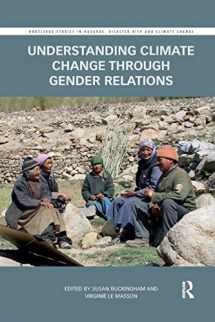
Understanding Climate Change through Gender Relations (Routledge Studies in Hazards, Disaster Risk and Climate Change)
ISBN-13:
9780367218881
ISBN-10:
0367218887
Edition:
1
Author:
Susan Buckingham, Virginie Le Masson
Publication date:
2019
Publisher:
Routledge
Format:
Paperback
224 pages
Category:
Geography
,
Earth Sciences
,
Technology
,
Human Geography
,
Social Sciences
FREE US shipping
Book details
ISBN-13:
9780367218881
ISBN-10:
0367218887
Edition:
1
Author:
Susan Buckingham, Virginie Le Masson
Publication date:
2019
Publisher:
Routledge
Format:
Paperback
224 pages
Category:
Geography
,
Earth Sciences
,
Technology
,
Human Geography
,
Social Sciences
Summary
Understanding Climate Change through Gender Relations (Routledge Studies in Hazards, Disaster Risk and Climate Change) (ISBN-13: 9780367218881 and ISBN-10: 0367218887), written by authors
Susan Buckingham, Virginie Le Masson, was published by Routledge in 2019.
With an overall rating of 3.9 stars, it's a notable title among other
Geography
(Earth Sciences, Technology, Human Geography, Social Sciences) books. You can easily purchase or rent Understanding Climate Change through Gender Relations (Routledge Studies in Hazards, Disaster Risk and Climate Change) (Paperback) from BooksRun,
along with many other new and used
Geography
books
and textbooks.
And, if you're looking to sell your copy, our current buyback offer is $0.3.
Description
This book explains how gender, as a power relationship, influences climate change related strategies, and explores the additional pressures that climate change brings to uneven gender relations. It considers the ways in which men and women experience the impacts of these in different economic contexts. The chapters dismantle gender inequality and injustice through a critical appraisal of vulnerability and relative privilege within genders. Part I addresses conceptual frameworks and international themes concerning climate change and gender, and explores emerging ideas concerning the reification of gender relations in climate change policy. Part II offers a wide range of case studies from the Global North and the Global South to illustrate and explain the limitations to gender-blind climate change strategies. This book will be of interest to students, scholars, practitioners and policymakers interested in climate change, environmental science, geography, politics and gender studies.


We would LOVE it if you could help us and other readers by reviewing the book
Book review

Congratulations! We have received your book review.
{user}
{createdAt}
by {truncated_author}


